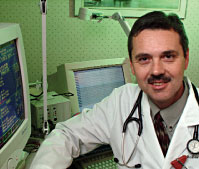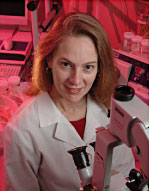 
For Larry Hollenbeck, healthcare is more than just a profession; it is a way of life. The KU Medical School alumnus loves to exercise, and he stays active with his wife by participating in the lives of their five children. Recently, Hollenbeck competed in a team triathlon, along with his wife and one of his four daughters. “Running is probably my strongest suit,” Hollenbeck claimed, “but I’m willing to do the swimming or cycling leg of the triathlon too.”
Hollenbeck’s love for exercise found an academic counterpart in his first year in medical school, when he worked on research with a neurophysiologist. By the end of that year, he was hooked on neurology, and he has watched with amazement as knowledge in the field has exploded ever since. Keeping those muscles in shape is important to this neurologist, who spends most of his day treating patients with disorders that are deteriorating their muscular abilities. Hollenbeck and a colleague started a neurology group that has grown to six partners. “We’re a general neurology group, so we see all sorts of patients. We treat people with Parkinson’s disease, multiple sclerosis—even giving Botox to people with migraine headaches.”
Hollenbeck’s love for staying active also has a perfect outlet in his family. “I’m a family guy. Other than playing classical guitar, I guess you could say my only real hobby is my family.” Apparently, his passion for medicine has been inherited by his first child, a son who is in pre-med. at the University of Kansas. He also has a daughter at KU, with other daughters ranging in age down to a five-year-old pre-schooler.
When not actively keeping his body in shape, Hollenbeck tries to keep his mind in order, which is no small feat, given the constant flow of new information, medicine and technology in his field.
“In the past 10 years, we’ve seem dramatic advances in our ability to treat multiple sclerosis, alzheimer’s disease and even stroke patients,” Hollenbeck said. “What excites me is the possibility that in the next 10 years, we might see not just improved treatments, but actual cures for problems that were barely understood when I first entered this field.”
|
 
Verda Hunter knows her name is associated with the discovery of the drug dilution case of Robert Courtney, but she is eager to show that what distinguishes her most is her attention to both the patient and the classroom. She teaches at the KU and UMKC Schools of Medicine, and she works at The Resource Center where she is responsible for resident education related to cervical cancer, ovarian cancer and the rest of the female cancers. But before you decide Hunter cares foremost about academic medicine, Hunter insists that you keep in mind that she has a private practice where she works four days a week.
“I try to take a serious role in patient care, education and research,” Hunter says. “To be a great doctor, I think you have to work toward a balance of all three areas.”
Compassion fills the voice of Hunter, as she explains how important it is for her to provide outstanding care to women. Hunter is herself a mother of four children, ranging in age from 15 to 21; and her experience of motherhood helps drive her concern for other mothers facing difficult illnesses.
Hunter started out wanting to be a midwife, with a degree in nursing from the University of Iowa. As her knowledge of obstetrics grew, she took greater interest in gynecology and eventually enrolled in medical school at the University of Illinois at Chicago. “During my residency, my director was a gynecologist/oncologist,” said Hunter, “and I learned there were only two board-certified women in gynecology/oncology in the nation. That seemed like just enough of a dare to focus my energy toward becoming the next woman in the field.”
What excites Hunter about her field is the work being done to develop new tests to detect cancer earlier. “Our knowledge of genetic disorders is growing, and we’re learning how these disorders relate to cancer,” Hunter says. “Once we understand the genetic abnormalities that lie behind a particular cancer, we can work to cater our therapy to that cancer instead of just a shotgun blast of chemotherapy.”
Hunter looks forward to the day when cancer treatment is perfected, and she hopes to be a part of the research that drives the revolution.
|
|
“Go where life takes you . . . and find good mentors along the way.” That is the philosophy of Mary Anne Jackson, the Section Chief of Pediatric Infectious Diseases at Children’s Mercy Hospital. Jackson has the energy to lecture 20 times a year regionally and nationally, and she writes a regular column for “Pediatric News.” She also has a determined spirit, which she got from her parents. Jackson’s father was an optician in St. Louis, while her mother was an ICU nurse and a role model to Mary Anne for “going beyond what you think you can do in life.” Jackson’s mom completed her schooling after having three kids, and that determination was passed down to her daughter, who had already taken an interest in medicine. Through her teen years, Mary Anne was a candy striper at St. Joseph’s Hospital in St. Louis, and by the time of her graduation, she’d been accepted to enter the University of Missouri’s six-year medical school program that received students straight out of high school.
At MU, Mary Anne met Jay, her husband of 26 years, who was also studying medicine. Jay became an interventional cardiologist, while Mary Anne went into pediatrics. They moved to Texas for her post-graduate fellowships, where Mary Anne found a new mentor in Dr. George McCracken.
Early in her work, Jackson lost five kids in a single month, with each of whom she had spent countless hours developing relationships. That tragic month compelled her to explore infectious diseases in compromised hosts. Her research into both cystic fibrosis and cancer was followed by a year in an animal lab. When both Jay and Mary Ann had completed their fellowships, they moved to Kansas City, where Mary Anne has been a champion for children ever since.
Seeing so much pain in the children at her job has influenced Jackson to take great joy raising her own children. Her fondest memory came from a trip Jackson and her daughter, Lindsay, took to El Salvador to work in a clinic. “What impressed me most wasn’t the volunteer work of the doctors there, but watching my daughter translating, helping to build a community that cared for these people who would otherwise have no hope.”
|
|